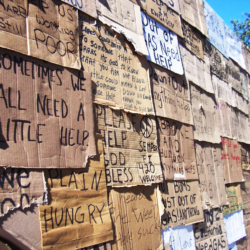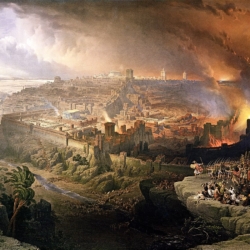This anonymously authored ḳinah (קינה, song of “lamentation”) begins with the line “אוֹי נָא לָֽנוּ כִּי חָטָֽאנוּ” (oy na lanu ki ḥatanu, “Woe—alas—unto us, for we have sinned”). Although the ancient Roman Jewish historian Flavius Josephus blames the Roman Empire for the destruction of the Jewish Temple in Jerusalem in 70 CE—and Roman art even celebrates the Roman capture of the Temple’s candelabrum—this ḳinah suggests that the destruction of Jerusalem was, at least partially, the result of Jewish discord. The ḳinah, which was long part of the Romanian prayer service for Tish’ah b’Av, appears in few other traditional prayerbooks for Tish’ah b’Av. It seems that the author of this ḳinah was El’azar ben Kallir (ca. 570–640 CE), who composed approximately half of the kinot most commonly inserted into contemporary Tish’ah b’Av prayerbooks that include the 40-odd most common kinot (קינות, plural of ḳinah) Jews sang throughout Europe during much of the early modern period. The author did not sign their name but left us with an alphabetical acrostic listing of often-concrete reasons to mourn today.[1] Much of the Hebrew text here derives from the version transcribed by Daniel Goldschmidt in his critical edition of סדר הקינות לתשעה באב (Seder HaKinot LeTish’ah Be’Av, “Order of Kinot for Tish’ah b’Av”) (Jerusalem, Israel: Mosad Harav Kook, 5732 A.M.), p. 26, based on Oxford’s Bodleian Library manuscript, Oppenheim 776. Goldschmidt writes “Oxford 1759,” but it is unclear to me at this time what 1759 represents. I have modified a few vowels where I disagreed with Goldschmidt’s vocalization.
| Contribute a translation | Source (English) |
|---|---|
אוֹי נָא לָֽנוּ כִּי חָטָֽאנוּ. נֵשֵׁב בָּדָד וְנִבְכֶּה. עַל־אֵֽלֶּה אֶבְכֶּה׃ |
Woe—alas—unto us, for we have sinned. We sit in isolation, and we weep. Over these I weep. |
עַל אַרְמוֹן כִּי נֻטָּשׁ. נֵשֵׁב בָּדָד וְנִבְכֶּה. עַל בַּֽיִת כִּי נִשְׂרַף. נֵשֵׁב בָּדָד וְנִבְכֶּה. עַל־אֵֽלֶּה אֶבְכֶּה׃ |
Over the palace,[2] Here and most references to architecture, interior design, or tools throughout this kinah reference, in whole or in part, the Temple destroyed in Jerusalem in 70 CE. for it is abandoned— We sit in isolation, and we weep. Over the house, for it has burned. We sit in isolation, and we weep. Over these I weep. |
עַל גְּזֵרוֹת כִּי נֻפָּֽצוּ. נֵשֵׁב בָּדָד וְנִבְכֶּה. עַל דְּבִיר כִּי נֶהֱרַס. נֵשֵׁב בָּדָד וְנִבְכֶּה. עַל־אֵֽלֶּה אֶבְכֶּה׃ |
Over decrees, for they spread[3] The spreading of Roman decrees banning or limiting Jewish practice appears to be lamented—not because of Jewish complicity but because of internal Jewish strife that distracted Jews from intervening. — We sit in isolation, and we weep. Over the inner chamber, for it was destroyed— We sit in isolation, and we weep. Over these I weep. |
עַל הֲדוּרִים כִּי נִכְחָֽדוּ. נֵשֵׁב בָּדָד וְנִבְכֶּה. עַל וָוִים כִּי הָבְקָֽעוּ. נֵשֵׁב בָּדָד וְנִבְכֶּה. עַל־אֵֽלֶּה אֶבְכֶּה׃ |
Over the majestic,[4] This may reference the Israelites, themselves linked to God’s “majesty” (הדר, hadar) in Psalm 90:16 affirming to God, “וַ֝הֲדָרְךָ֗ עַל־בְּנֵיהֶֽם׃” (vahadarekha al beneyhem, “Your glory is upon the children [of the Israelites]”). Alternatively, this may reference some Temple treasury of citrus fruits we now identify by the name etrog (אתרוג) but are more ambiguously referenced (if at all) in Leviticus 23:40’s injunction for God’s people to take hold of “פְּרִ֨י עֵ֤ץ הָדָר֙” (peri ets hadar, “the fruit of a tree of majesty”). for they have been extinguished— We sit in isolation, and we weep. Over hooks, for they have been split— We sit in isolation, and we weep. Over these I weep. |
עַל זֵדִים כִּי הָגְבָּֽרוּ. נֵשֵׁב בָּדָד וְנִבְכֶּה. עַל חֶרְפָּה כִּי הָגְדָּֽלָה. נֵשֵׁב בָּדָד וְנִבְכֶּה. עַל־אֵֽלֶּה אֶבְכֶּה׃ |
Over the malicious, for they have overcome— We sit in isolation, and we weep. Over the disgrace, for it was aggrandized— We sit in isolation, and we weep. Over these I weep. |
עַל טֽוּרֵי אֶֽבֶן כִּי נִפְרָֽשׁוּ. נֵשֵׁב בָּדָד וְנִבְכֶּה. עַל יְלָדִים כִּי נִפְזָֽרוּ. נֵשֵׁב בָּדָד וְנִבְכֶּה. עַל־אֵֽלֶּה אֶבְכֶּה׃ |
Over towers of stone, for they have been severed— We sit in isolation, and we weep. Over children, for they have been scattered— We sit in isolation, and we weep. Over these I weep. |
עַל כַּֽעַס כִּי הִרְבָּה. נֵשֵׁב בָּדָד וְנִבְכֶּה. עַל לִמּוּדִים כִּי נִמְנָֽעוּ. נֵשֵׁב בָּדָד וְנִבְכֶּה. עַל־אֵֽלֶּה אֶבְכֶּה׃ |
Over anger, for it became too much— We sit in isolation, and we weep. Over studies, for they were prevented— We sit in isolation, and we weep. Over these I weep. |
עַל מְלָכִים כִּי נִמְאָֽסוּ. נֵשֵׁב בָּדָד וְנִבְכֶּה. עַל נְדִיבִים כִּי פַֽסּוּ. נֵשֵׁב בָּדָד וְנִבְכֶּה. עַל־אֵֽלֶּה אֶבְכֶּה׃ |
Over sovereigns, for they were rejected— We sit in isolation, and we weep. Over dignitaries, for they overinfluenced— We sit in isolation, and we weep. Over these I weep. |
עַל שָׂרִים כִּי שֻׁדָּֽדוּ. נֵשֵׁב בָּדָד וְנִבְכֶּה. עַל עֲנָוִים כִּי הוֹבִֽישׁוּ. נֵשֵׁב בָּדָד וְנִבְכֶּה. עַל־אֵֽלֶּה אֶבְכֶּה׃ |
Over officers, for they were plundered— We sit in isolation, and we weep. Over the humble, for they were ashamed— We sit in isolation, and we weep. Over these I weep. |
עַל פְּדוּיִם כִּי גָֽלוּ. נֵשֵׁב בָּדָד וְנִבְכֶּה. עַל צְמוּדִים כִּי נִפְרָֽדוּ. נֵשֵׁב בָּדָד וְנִבְכֶּה. עַל־אֵֽלֶּה אֶבְכֶּה׃ |
Over the redeemed, for they had been exiled[5] This appears to reference the people Israel who had been previously taken captive in Babylonia upon the destruction of the first Temple in Jerusalem in 587 BCE.—only to return to the Land of Israel and to be exiled again upon the destruction of the second Temple in 70 CE. — We sit in isolation, and we weep. Over the bound, for they became separated[6] This may reference either the bond of the people Israel with God—or this may reference the Temple’s architectural insertions and connections. — We sit in isolation, and we weep. Over these I weep. |
עַל קְרוֹבִים כִּי נִרְחָֽקוּ. נֵשֵׁב בָּדָד וְנִבְכֶּה. עַל רְבִיבִים כִּי נִמְחוּ. נֵשֵׁב בָּדָד וְנִבְכֶּה. עַל־אֵֽלֶּה אֶבְכֶּה׃ |
Over the near ones, for they became distanced[7] “The near ones” (in Hebrew, “קרובים,” ḳerovim) may refer to familial relatives. Simultaneously this verse evokes the divine greeting in Isaiah 57:19, “שָׁל֨וֹם ׀ שָׁל֜וֹם לָרָח֧וֹק וְלַקָּר֛וֹב” (shalom shalom laraḥoḳ velaḳḳarov, “Peace, peace, unto the distant, and to the near”). — We sit in isolation, and we weep. Over potent rains, for they have been eradicated— We sit in isolation, and we weep. Over these I weep. |
עַל שְׁלֵמִים כִּי טֻלְטָֽלוּ. נֵשֵׁב בָּדָד וְנִבְכֶּה. עַל תְּמִידִים כִּי בֻטָּֽלוּ. נֵשֵׁב בָּדָד וְנִבְכֶּה. עַל־אֵֽלֶּה אֶבְכֶּה׃ |
Over the whole offerings, for they have been displaced— We sit in isolation, and we weep. Over the daily offerings, for they have been annulled— We sit in isolation, and we weep. Over these I weep. |
The text of the ḳinah as transcribed comes from Ernst Daniel Goldschmidt’s Seder HaḲinot LeTish’ah b’Av p. 26
Notes
| 1 | Much of the Hebrew text here derives from the version transcribed by Daniel Goldschmidt in his critical edition of סדר הקינות לתשעה באב (Seder HaKinot LeTish’ah Be’Av, “Order of Kinot for Tish’ah b’Av”) (Jerusalem, Israel: Mosad Harav Kook, 5732 A.M.), p. 26, based on Oxford’s Bodleian Library manuscript, Oppenheim 776. Goldschmidt writes “Oxford 1759,” but it is unclear to me at this time what 1759 represents. I have modified a few vowels where I disagreed with Goldschmidt’s vocalization. |
|---|---|
| 2 | Here and most references to architecture, interior design, or tools throughout this kinah reference, in whole or in part, the Temple destroyed in Jerusalem in 70 CE. |
| 3 | The spreading of Roman decrees banning or limiting Jewish practice appears to be lamented—not because of Jewish complicity but because of internal Jewish strife that distracted Jews from intervening. |
| 4 | This may reference the Israelites, themselves linked to God’s “majesty” (הדר, hadar) in Psalm 90:16 affirming to God, “וַ֝הֲדָרְךָ֗ עַל־בְּנֵיהֶֽם׃” (vahadarekha al beneyhem, “Your glory is upon the children [of the Israelites]”). Alternatively, this may reference some Temple treasury of citrus fruits we now identify by the name etrog (אתרוג) but are more ambiguously referenced (if at all) in Leviticus 23:40’s injunction for God’s people to take hold of “פְּרִ֨י עֵ֤ץ הָדָר֙” (peri ets hadar, “the fruit of a tree of majesty”). |
| 5 | This appears to reference the people Israel who had been previously taken captive in Babylonia upon the destruction of the first Temple in Jerusalem in 587 BCE.—only to return to the Land of Israel and to be exiled again upon the destruction of the second Temple in 70 CE. |
| 6 | This may reference either the bond of the people Israel with God—or this may reference the Temple’s architectural insertions and connections. |
| 7 | “The near ones” (in Hebrew, “קרובים,” ḳerovim) may refer to familial relatives. Simultaneously this verse evokes the divine greeting in Isaiah 57:19, “שָׁל֨וֹם ׀ שָׁל֜וֹם לָרָח֧וֹק וְלַקָּר֛וֹב” (shalom shalom laraḥoḳ velaḳḳarov, “Peace, peace, unto the distant, and to the near”). |

“אוֹי נָא לָֽנוּ כִּי חָטָֽאנוּ | Oy Na Lanu Ki Ḥatanu (Woe alas unto us, for we have sinned), a ḳinah possibly by Elazar ben Killir (ca. 7th c.)” is shared through the Open Siddur Project with a Creative Commons Attribution-ShareAlike 4.0 International copyleft license.










Leave a Reply